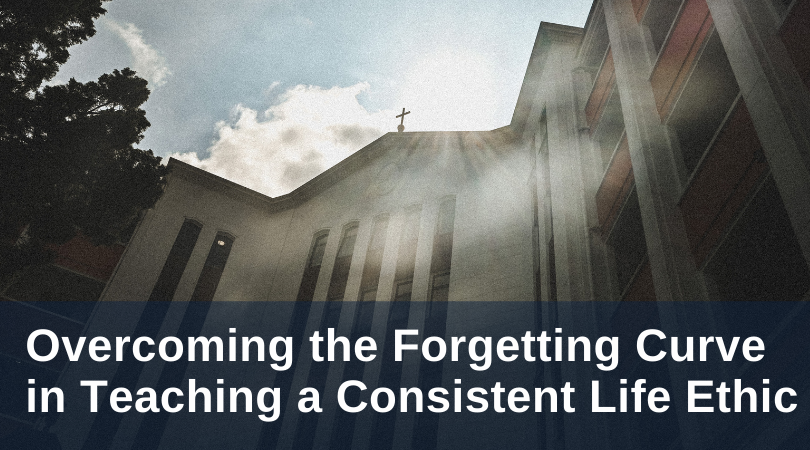
As a high school moral theology teacher, and especially after a tumultuous political season, I’m deeply invested in whether my students gain a solid understanding of a consistent Catholic ethic of life—which recognizes the human person’s inalienable dignity from womb to tomb. Whatever their future vocation, I hope they retain a deep-in-their-bones conviction that all human life, and indeed all of God’s creation, has profound value that must be nurtured and protected.
But how can we make sure a consistent life ethic “sticks” with our students? How can we best nurture in them a life-long commitment to the Church’s social mission, as a vital aspect of discipleship?
No doubt you’ve experienced the so-called (and rather depressing) “forgetting curve” in your classroom. Without reinforcement, we human beings tend to forget prior knowledge at alarming rates—approximately 56% after one hour and 75% after six days! Fascinating neuroscientific research suggests that our brains are actually wired to forget rather than to remember information. But on the bright side, this same research highlights strategies that help students actually retain their learning. I’d like to explore what they might look like as we educate students about Catholic Social Teaching and a consistent life ethic.
One strategy that helps learning “stick” is called “conceptual interleaving.” Interleaving involves helping students make as many connections to an idea as possible—typically to other, seemingly unrelated concepts—creating a “‘spiderweb’ of neural connection.” So let’s say students are discussing harmful cultural trends concerning human sexuality in a Christian Life course. These include an exaggerated notion of personal autonomy, loss of genuine intimacy and mutual responsibility in relationships, and a contraceptive and abortive mentality that hurts everyone involved. Then what if, in English class, these same students could analyze poems by three Pulitzer Prize-winning poets, in which these women reflect poignantly on their deeply personal experiences of motherhood, abortion, and loss. And in a Social Studies unit, they could review historical examples of the systematic extermination of marginalized groups, such as Native Americans, but then consider the present-day practice of disability-selective abortion (DSA) as another example of this kind of injustice.
A secondary benefit of this interdisciplinary “interleaving” is that students can begin to think creatively with the Church’s rich Social Tradition, learning to apply pro-life principles consistently and transcending a simplistic liberal-conservative framework for recognizing and addressing social injustice. Having considered well the tragedy of abortion, students could consider immigration, racism, and environmental degradation as life issues, too.
Sounds awesome, but also like a lot of curriculum work for teachers, right? Here’s the great news: Notre Dame’s McGrath Institute for Church Life continues to add to its Teaching Human Dignity series, a one-of-a-kind collection of free, high-quality learning resources that incorporate a Catholic vision of human dignity into curriculum areas like English, social studies, economics, mathematics, and even health class. The curriculum “heavy-lifting” is already being undertaken by leading pro-life scholars and educational specialists.
Theology teachers need help forming the next generation of compassionate, courageous pro-life leaders. And the latest research suggests how much our students will benefit when we overcome the artificial silo effect between academic disciplines and help them discover the Gospel of Life where they might not expect it. Our colleagues who teach outside of theology are essential partners in doing just that.
Visit the Teaching Human Dignity resources page by clicking the button below:
Editorial Note: This post originally appeared on NCEATalk, the blog of the National Catholic Education Association on March 9, 2021. It is republished here with permission.
Featured image by jojo (sharemyfoodd) via Unsplash



